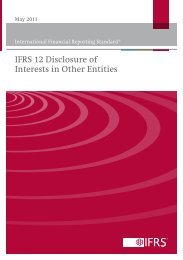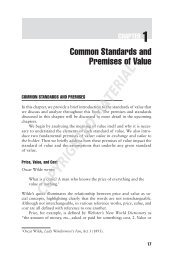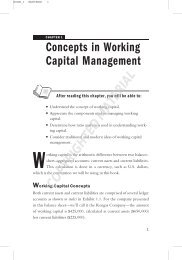ISSUE 5 2008 - Sweet & Maxwell
ISSUE 5 2008 - Sweet & Maxwell
ISSUE 5 2008 - Sweet & Maxwell
You also want an ePaper? Increase the reach of your titles
YUMPU automatically turns print PDFs into web optimized ePapers that Google loves.
394 Case & Comment [<strong>2008</strong>]<br />
punishment which he would not otherwise have faced had he been able to rely on the<br />
privilege.<br />
[A.J.R.]<br />
Rape<br />
Fresh evidence—evidence of complainant making numerous false complaints—effect on<br />
credibility—whether conviction unsafe<br />
Admissibility; Credibility; Cross-examination; False statements; Fresh<br />
evidence; Rape; Victims<br />
R. v C<br />
Court of Appeal (Criminal Division): Sir Igor Judge P., Pitchford J. and Sir<br />
Richard Curtis: October 16, 2007; [2007] EWCA Crim 2551.<br />
The complainants, K and L, were sisters. They made allegations against the<br />
defendant of rape and indecent assault. At the defendant’s trial, K was crossexamined<br />
about a number of false allegations, including allegations of sexual<br />
offences, which she had made against other people. The allegations made by<br />
L were very similar. In cross-examination, L confirmed that she had wanted to<br />
stay with her sister and that she had been aware that K wanted to leave their<br />
father’s house. She denied that K had told her what she should say when she<br />
was interviewed or that she and K had made up the allegations so that they<br />
could leave home together. The essence of the defendant’s defence was that<br />
the evidence given against him represented a complete fabrication. In 2000, the<br />
defendant was convicted of two counts of rape and indecent assault in respect of<br />
both complainants. In 2002, the Criminal Cases Review Commission was invited<br />
to consider the safety of the convictions on the basis that K had made a false<br />
allegation of rape against her brother in 2001. At that stage, there was no evidence<br />
to suggest that the allegation was false. Accordingly, the Commission decided that<br />
there was no basis upon which to refer the case to the Court of Appeal. However,<br />
in 2006, the defendant again invited the Commission to conduct a review of<br />
his conviction on the basis that K had been cautioned for wasting police time<br />
following allegations of sexual abuse that she had made against her stepfather. An<br />
investigation undertaken by the Commission demonstrated that K had a proved<br />
tendency to make false allegations that she was a victim of sexual crime. Such<br />
allegations included reports that she had been raped by her brother, a customer at<br />
her place of work, a boyfriend and her stepfather. The Commission referred the<br />
defendant’s case to the Court of Appeal, pursuant to s.9 of the Criminal Appeal<br />
Act 1995. Even after the defendant’s convictions were referred, K made a false<br />
allegation of rape against a former boyfriend.<br />
Held, allowing the appeal, a moment’s glance at the facts would demonstrate<br />
that the new material would severely undermine any confidence that any jury could<br />
have had in K’s evidence; the credibility of K was damaged beyond repair. The<br />
defendant’s conviction for rape and indecent assault on K were flawed. They had<br />
to be quashed. Moreover, the fresh evidence would have had a direct impact not<br />
only on the jury’s judgment of the allegation made by K, but also those made<br />
by L, simply because of their close relationship and the desire she had expressed<br />
© SWEET &MAXWELL






